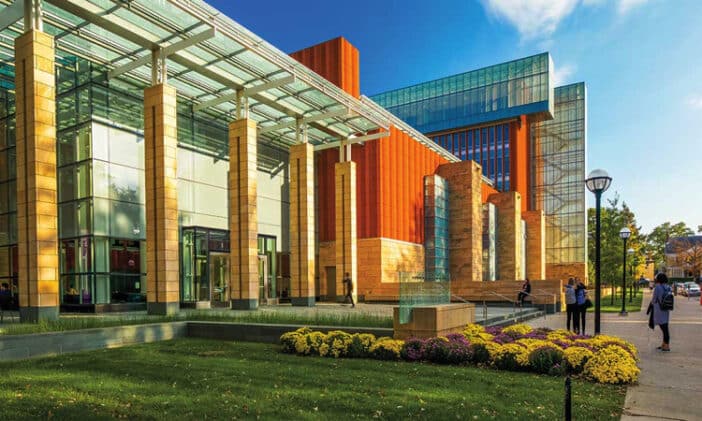As the sports business field continues to grow, its career options increasingly include those connected to sports wagering. Last week, the Stephen M. Ross School of Business at the University of Michigan hosted its third Michigan Sports Tech Conference, a virtual event that brought together multiple industry experts and leaders covering a variety of subjects.
“This is my first year helping out with the conference, and last year was the first time we touched on the topic of sports gambling,” said Samir Syed, one of the conference panel coordinators. “It’s something that has become more and more relevant as time has gone on and makes sense at this intersection of sports and technology we’re working with, and lends itself easily to the rest of the point of what the conference is.”
The event was originally planned to debut in 2020 but canceled due to the COVID-19 pandemic. Michigan launched sports wagering at its three Detroit-based casinos days before the country was shut down in March 2020. It then launched mobile wagering with a multiple-operator launch in January 2021.
In the three years the conference has been held, it has enjoyed year-over-year growth in attendance, quickly becoming a popular event for those seeking potential career paths in the sports business field.
“We really wanted to make a more accessible sports tech conference,” said fellow panel coordinator George Lober. “There were a lot of conferences that take place that really cost a ton, needed to be in person, and it’s really hard for students in particular to attend.
“We were hoping to create a conference that allowed more accessibility across the board from a cost standpoint, an attendance standpoint, and really from a value perspective enabling high-caliber speakers on quality conversation and accessibility to anyone in the industry, and particularly students who were really interested in what was happening in the industry and students who wanted to pursue a career across various elements of sports business.”
Colleges’ sportsbook partnerships under scrutiny
Sports wagering, as it pertains to college campuses, is a sticky subject. The University of Colorado on Wednesday announced it was ending its partnership with PointsBet just two years into a five-year deal, with the agreement one of the more notable ones that has come under recent scrutiny. U.S. Sen. Richard Blumenthal of Connecticut recently sent a letter to 66 colleges and universities requesting information about any current or potential partnerships with sportsbook operators and asking what the schools are doing to combat problem and underage gambling.
Michigan State entered a $9 million partnership with Caesars Sportsbook in January, an agreement that could be challenged given the rules changes adopted by the American Gaming Association on Tuesday to disallow partnerships between sportsbooks and schools. The AGA is not a government agency but sets the standards for regulation in the industry. With March also serving as Problem Gambling Awareness Month in the industry, the conference proved timely with a panel that examined the state of sports wagering.
“I think it’s important to have that demographic included in that conversation, and the fact that in all likelihood everyone who was joining in was of legal age was helpful,” said Patrick Everson, senior reporter for Vegas Insider, in regards to reaching out to the 20-something generation. “There’s this tap dance people are doing right now, operators are doing, and content providers are doing such as ourselves with the demographic.
“When you’re talking college in general, you’re talking mostly undergrad, and a lot of undergrads aren’t of age. At least in this sense, I think taking it at the college level and having these conversations, even if they aren’t 21, are good conversations to have because they need to be aware of these conversations.”
Lober noted the panel brought up responsible gaming during its discussions, highlighting the challenges operators face while promoting a highly popular event such as the NCAA Tournament, which continues this weekend with the Final Four in Houston.
“We had several different operators in the sports betting industry as well as the NBA, and the shared message on the importance of responsible gaming,” Lober said. “It’s March right now, it’s responsible gaming month, and that topic came up several times.”
Different opinions on the future of esports
Though panel coordinators, Syed and Lober had their own observations running the gamut of subject matter discussed on the panels they brought to the Stephen M. Ross School of Business. Interestingly, they diverged on how esports could impact the sports wagering landscape.
Long touted as a vertical with revenue potential for the industry, esports has yet to gain substantial traction, even as more schools incorporate it into their athletic programs and regulators in Nevada finalize rules to make it a more accessible offering for operators.
“I’ve seen some gaming companies go in the opposite direction in the Web3 space and turn to gambling that way versus traditional sportsbook partners,” Syed said. “I feel like I’ve seen it on some offshore books of some esports gaming categories, but I feel like the direction that fan base is headed toward is away from your traditional sportsbook.”
“It’s so difficult to start any sportsbook from the ground up, and the cost goes into that, the customer acquisition, the technology, even if you have a technological advantage across the board. Esports seems ripe for more of an integrated partner,” countered Lober. “You can have that chat box on the side that’s really directly connected to an operating sportsbook that runs those lines, and that integrated partnership where the sportsbooks become slightly more profitable in those areas and the ability to enhance the sport and enhance awareness.”
What the future holds
Syed sees the conference finding a foothold by straddling the two types of attendees, “the die-hard sports fans and people interested in the more business-facing sides of it.” He added merging the technology angle “covers a lot of real estate in terms of what people who are interested in outside their career and merging that with what professional outcomes and prospects look like.”
Lober highlighted the work of the Sports Business Association at Michigan, which has “consulting projects with various ‘Big 4’ [sports] franchises, with start-ups, different things to give people real-life exposure to things and have discussions throughout the year.”
That, along with the MBA Sports Business Alliance — formed primarily by Michigan grads — has expanded the school’s networking reach to include some of the top business schools and programs across the country.
The pair expect sports wagering to continue to be part of future conferences. Lober noted the evolution of the discussion going from “product” last year to “data and the league partnerships and how that has evolved and continues to evolve and impacts the fan engagement side.”
Syed suggested that Name, Image, and Likeness (NIL) deals will be more front and center along with conference realignments, something Michigan will experience in 2024 with the additions of UCLA and Southern California to the Big Ten.
Photo courtesy of University of Michigan





